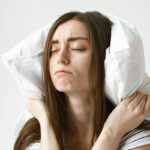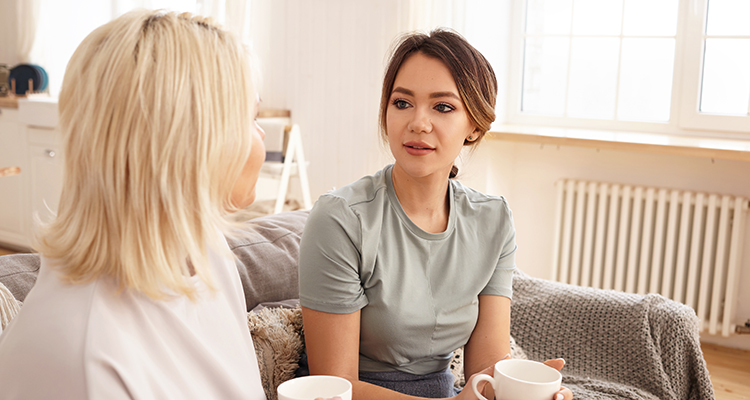The Ups and Downs of Anxiety & Insomnia
Why can’t you fall and stay asleep all night? Your inability to get quality sleep could be making you anxious. Or perhaps, your racing mind, worries, and/or fears are preventing you from drifting off asleep. What is it? Could your anxiety and insomnia be interconnected? Absolutely!
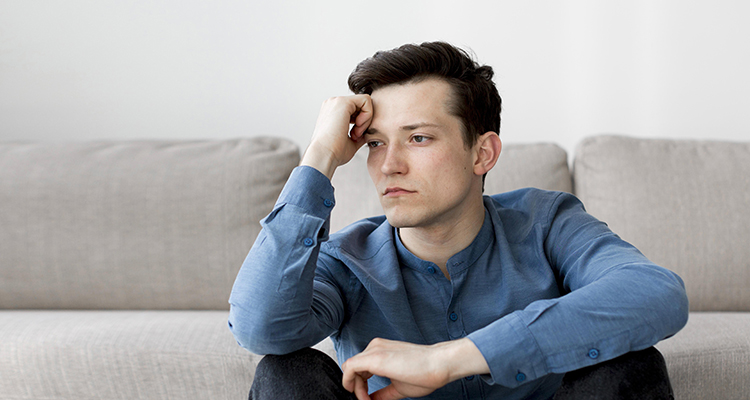
Approximately 20% of American adults are dealing with an anxiety disorder in any given year. The truth is without proper sleep, it’s nearly impossible to function at an optimal level the next day. This can be especially hard for 20-somethings, who are in the prime of their lives. Minus COVID concerns, this is a time for young adults to have fun, explore, and grow. And, while all of that is true, if you aren’t getting enough sleep or any sleep at all, then you can’t do those things anyway.
In fact, you’ll most likely be too tired to do anything. Plus, how can you function at work if you’re running on fumes from last night? You can’t. So, you spend the day walking around like a “zombie on crack” – hula-hoop bags under your eyes, fuzzy thinking, forgetfulness, body aches, irritability, anxiety, and daytime fatigue and sleepiness. What day is it again?
Honestly, getting a good night’s sleep at any age can be…challenging. You don’t have to be a fresh-faced 20- or 30-something to experience anxiety or insomnia, or anxiety-based insomnia or insomnia-based anxiety. Middle-age and older adults can also struggle with this cyclic combination (anxiety and insomnia). In other words, if you have anxiety, it can trigger insomnia, and if you have insomnia, it can trigger anxiety.
Anxiety and insomnia are two common issues that can hinder your ability to fall and stay asleep. Both conditions can keep you up all night, fretting because you can’t relax and fall peacefully asleep. And, before you know it, it’s morning and time to start your day. The fact is anxiety and insomnia play off each other, triggering or aggravating the other. What does that mean? It means that it’s easy to fall into a never-ending cycle of anxiety and insomnia.
The result? Little-to-no sleep…until you receive help for your primary condition or both conditions! The good news is if you suffer from anxiety, insomnia, or a combination of both, you’re not alone. Although your situation may feel hopeless, it’s not.
You’re not a hamster spinning on the anxiety/insomnia wheel. Some treatments will help you get your anxiety and “sleeplessness” under control, so you can get some quality zzz. With the right help, you can stop your anxiety or insomnia from negatively affecting your sleep quality. You can stop the cycle of anxiety and insomnia!
Content
What is Anxiety?
Everyone gets the “jitters” sometimes. Everyone also worries a little too much sometimes. And, we all have fears, right? What does that mean? It means that anxiety can be “normal.” Anxiety only becomes an issue when it negatively affects your life and health and well-being. In other words, you are most likely suffering from a diagnosable form of anxiety if your “jitters,” worry, concern, panic, and/or fear become so severe that they restrict your movements and change how you see yourself, others, and the world around you. ‘
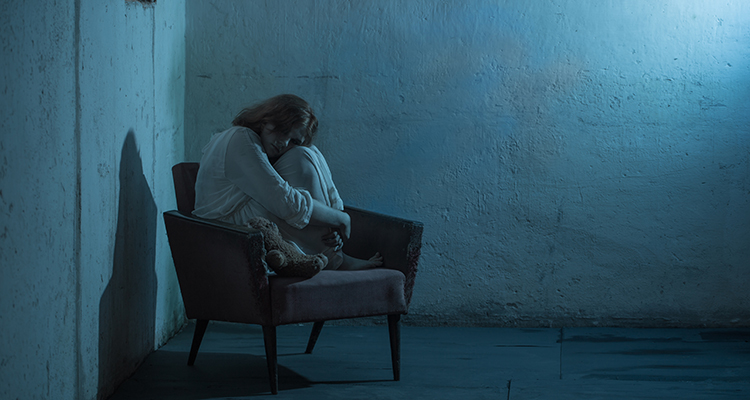
But, experiencing anxiety from time to time is healthy. Anxiety harkens back to the past when it was a necessity for survival. During those times and even today, anxiety triggers our internal fight/flight/freeze mechanism, so we can quickly escape from dangerous situations. It’s the same mechanism animals use to sense danger from predators.
And, while experiencing occasional anxiety can be normal and healthy, experiencing overwhelming, pervasive, frequent, restricting or limiting, life-altering, intense, reoccurring, or chronic, or even acute anxiety can signal an anxiety disorder. Understand that approximately 40 million American adults are diagnosed with an anxiety disorder each year – one of the most common mental health conditions in the U.S.
What causes anxiety disorders? Well, an anxiety disorder may be triggered by past trauma or a “bad experiences,” phobias (realistic or unrealistic fears), or a mental health condition that changes your perception of a situation or person. When you become anxious, your brain ramps-up its adrenaline production and releases it into your body, causing you to experience a variety of symptoms, such as heart palpitations, excessive perspiration (sweating), shakiness, shortness of breath, accelerated heartbeats, facial flushing, inattention or a lack of concentration and focus, and insomnia or “sleeplessness.”
When anxiety affects your sleep quality, you may feel “worn out” or exhausted the next day. You are also more likely to feel mentally “foggy” or confused, lack motivation, and experience extreme laziness and sleepiness. And, although, you may think you are “done” with your anxiety once morning hits – you’re not. It’s probably lying dormant until you get back home.
In other words, it’s probably staying away so you can perform your daily or work tasks, but it’s not gone for good. Your anxiety is still there, but now it’s the “steroid version.” Because, you didn’t sleep well the night before, your anxiety has worsened. So, if you were unable to sleep before because of your anxiety, your insomnia will heighten your anxiety and prevent you from sleeping that night as well.
Could My Anxiety Be Causing My Insomnia? Or, Is My Insomnia Making Me Anxious?
Yes, and yes…
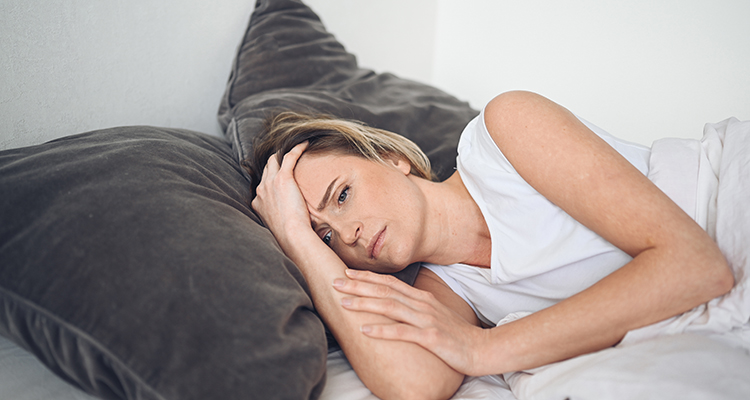
An unpleasant side-effect of anxiety is “sleeplessness” or insomnia. And, a dreadful consequence of “sleeplessness” or insomnia is anxiety. It’s two-fold.
What is insomnia? Approximately 3 million Americans suffer from insomnia, a common sleep condition. Insomnia can make it hard for you to fall asleep and stay asleep throughout the night. It can also negatively impact your sleep quality by causing you to toss and turn throughout the night, awaken several times at night, experience nightmares or night terrors, etc. Basically, it can lead to one tiring and restless night. And, when insomnia is coupled with anxiety, sleeping can feel like a never-ending battle – one you can’t win. But, you can.
When anxiety causes you to have sleepless nights, it is referred to as secondary insomnia. In other words, you can’t sleep because your anxiety (i.e., fears, worries, apprehension, concerns, racing thoughts, etc.) are preventing you from sleeping and/or staying asleep. However, if you miss several days of sleep, it can actually trigger or aggravate your anxiety. More specifically, it could cause you to worry excessively about your inability to fall asleep. It could even make you think something is terribly wrong with you – when there isn’t.
A lack of sleep can “mess” with your thought processes, causing you to become anxious about going to sleep. Eventually, you become so fixated on falling asleep that you develop an anxiety disorder. Many insomniacs do not realize that it’s their anxiety that is making it hard for them to get some quality zzz and many people with a history of anxiety do not realize that it’s their lack of sleep that is triggering or worsening their anxiety.
However, the only way to manage the anxiety and get some sleep is to determine the root cause and treat the primary condition. If the primary condition is addressed, for instance, anxiety-based insomnia, then most likely your sleep quality or ability to fall and stay asleep all night long will improve. Conversely, if the primary condition is insomnia, for instance, insomnia-based anxiety, then once the insomnia is addressed and you begin sleeping better, your anxiety symptoms should decrease.
In fact, a 2017 study found that “sleeplessness” or insomnia can disrupt your brain’s ability to process distressing or aversive emotions and experiences, which in turn can heighten your risk of developing a mental illness, like anxiety. Researchers also found that “sleeplessness” or insomnia can impact how your amygdala (the region of your brain that is responsible for memory and emotional regulation) functions.
How Are Anxiety & Insomnia Interconnected?
As you now know, a lack of sleep can increase your risk of experiencing anxiety, and anxiety can increase of experiencing “sleeplessness.” Anxiety can trigger your fight/flight/freeze survival mechanism, making it nearly impossible to fall asleep, stay asleep, or get good quality sleep. More specifically, anxiety can alter how your brain functions, causing you to obsess over things – upsetting or frightening things that probably won’t happen. Not only does the worrying zap your energy and lower your morale, but it also prevents you from falling into a deep, tranquil sleep. You just can’t stop thinking long enough for your mind and body to relax.
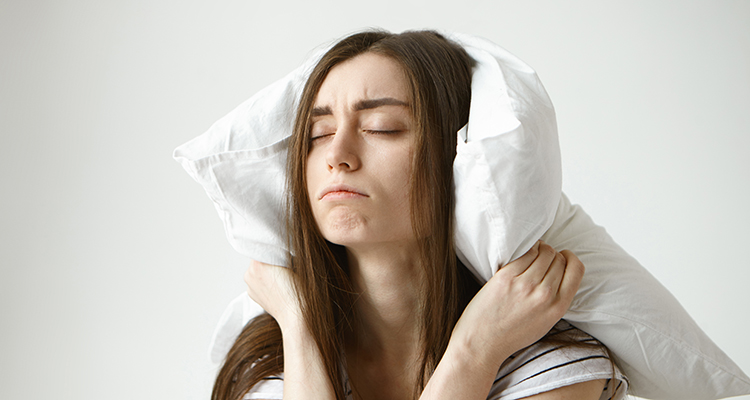
Then combine anticipatory anxiety with specific anxiety (a fear that you won’t be able to fall asleep) and you get insomnia. More specifically, you experience a “feedback loop process” (anxiety = insomnia = insomnia = anxiety) that trigger or worsens both conditions. When your brain and body do not get the sleep needed to properly heal and repair themselves from daily wear-and-tear, you naturally become more tired, confused, irritable, anxious, worried, concerned, and panicky. In other words, you’re unable to think clearly and you definitely aren’t able to get good quality zzz!
What’s It Like to Live in a Perpetual Cycle of Anxiety and Insomnia?
Your fears and worries prevent you from falling and staying asleep. Your anxiety mercilessly wakes you up multiple times a night, making it difficult, if not impossible, for you to fall peacefully back to sleep. You toss and turn all night long, making for one restless night. You got little-to-no sleep, so you’re extremely tired once sunrise approaches. And, guess what? You have a big presentation or meeting or a multitude of important tasks ahead of you that morning. You trudge through the day, running on coffee and fumes.
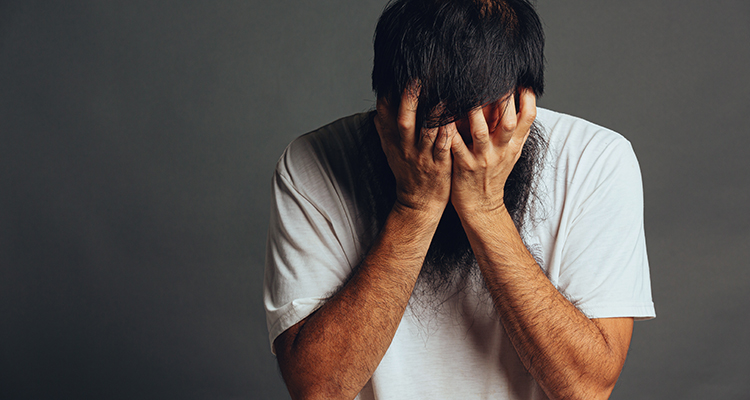
But somehow you persevere until it’s time to go home. Once home, the worrying begins again. You’ve been at work all day, so you’ve managed to quell your fears so you can perform your job functions, but now you’re “free.” So, your anxiety starts to creep back out. As bedtime approaches, you start to worry that you won’t be able to sleep again. As the minutes tick by, the worry turns into fear. And, the fear increases. Your heart races and you begin to sweat profusely. You try to count sheep, watch television, read a book, but nothing is helping because you’ve become fixated on the fear that you’ll be unable to sleep again.
So, of course, you can’t sleep. You desperately want to sleep, but your anxiety has overtaken you, so you are unable to relax long enough to fall asleep. You toss and turn and your head begins to ache. You close your eyes but they immediately pop open. “What was that noise?” “Why can’t I sleep?” “What if not sleeping causes my immune system to crash and I become sick?” “What if I’m so tired tomorrow that I have a car accident?” “What if…?” You can’t get these horrible and distressing thoughts out of your mind.
So, once again, you experience a sleepless night. The next night you try an online sleep program, melatonin supplement, OTC sleeping pills, and can get some rest. You feel rested, refreshed, and re-energized, but, unfortunately, it doesn’t last long. That night, your anxiety returns and you’re unable to sleep again, due to your racing thoughts, fears, and worries. “What if I bomb at work?” “Are my parents at home – it’s past 8pm?” “I’ve been having chest pains lately I hope nothing’s wrong with my lungs?” “My best friend hasn’t called me – is she upset with me?”
Once again, you don’t get a wink of sleep, staying up until morning. Your anxiety has prevented you from drifting-off to sleep.
Morning arrives and the daytime grogginess and extreme fatigue return in full force. And, now you have a new symptom – achiness. You ache everywhere. That night, you once again become so worried about being unable to sleep that… you’re unable to sleep. “Why can’t I sleep?” “Maybe something is wrong with me?” “Who doesn’t sleep?!” “What conditions cause ‘sleeplessness’ because I must have one of them?” “Maybe, I’ll never sleep again, but if I don’t sleep, I’ll get sick and die?” “Why can’t I sleep?!” You have a sleepless night. Your insomnia has worsened your anxiety to the point that you’re still unable to get sound sleep.
See how quickly anxiety turn into a never-ending cycle – unless you do something about it.
How Can I Get Some Sleep at Night?
The first step in addressing your anxiety and sleeplessness is to determine the true cause of your restless nights. Once you have determined your primary condition, your secondary condition should improve.
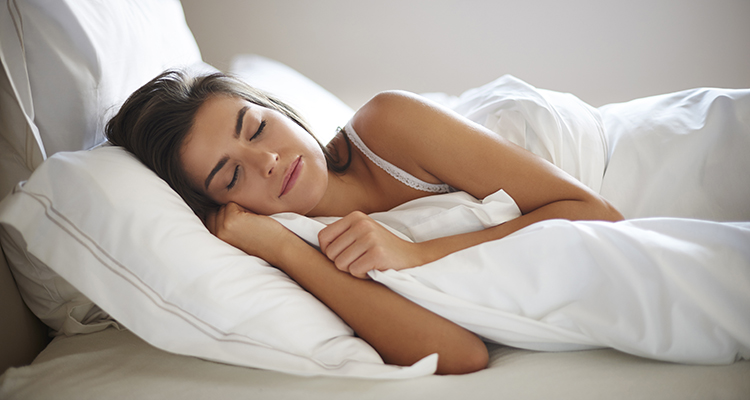
Anxiety & Insomnia Tools
Listed below are tools you can use to manage your anxiety symptoms, so you can get a good night’s sleep:
- Practising Deep Breathing ExercisesDeep breathing exercises can clear your mind, reduce your stress, and ease your anxiety, so you can relax when it’s time to go to sleep. So, when you feel your stress level rising and your anxiety creeping in, start breathing slowly and deeply. Slow, deep breaths can trigger your hypothalamus, which is connected to your pituitary gland (located in your brain).Your pituitary gland then releases neurohormones, which prevent your body from producing and releasing stress hormones (i.e., adrenocorticotropic hormone, epinephrine (adrenaline), norepinephrine, cortisol, and corticosteroid). This in turn activates your body’s relaxation response. The end result? A calmer mind and body when it’s time for bed.
- Listening to Soft, Calm MusicListening to soft, calm music while getting ready for work, working, eating dinner, brushing your teeth, and/or getting ready for bed can help you become more “centered” or focused, so your anxiety doesn’t escalate and overwhelm you by the end of the day.According to studies, music triggers the production and release of endorphins (“feel-good” hormones), thereby reducing or eliminating your anxiety symptoms. When your body doesn’t produce enough endorphins, you are at-risk of experiencing anxiety. Thus, researchers have concluded that music affects your brain, primarily because emotions and experiences are attached. As a result, music produces a calming effect on your mind and body.
- JournalingOne of the most distressing things about having anxiety is not knowing where it came from. The truth is anxiety can pop out of nowhere. In other words, you could be having the best time of your life, and all of a sudden you start to become anxious, worried, or concerned for absolutely no apparent reason. That’s where journaling could help. Journaling or documenting your thoughts, feelings, concerns, worries, and experiences can help you determine the root cause of your anxiety, so you can relax.In fact, researchers suggest that keeping a journal or diary can help you determine why you are feeling the way you feel. And, once you can pinpoint why you’re experiencing angst, your stress level decreases, and your body relaxes. This is especially beneficial if your anxiety has been negatively affecting your sleep quality.
Moreover, a 2018 study found that anxious individuals, who write about how they feel or who develop a to-do list for the next day before bed (5-15 minutes before going to sleep) tend to fall asleep faster and sleep better than those, who do not engage in this activity. Similarly, a 2011 study found that college students, who journal before bed typically experience a decline in bedtime stress, worry, and anxiety, prolonged sleep, and better sleep quality, than those, who do not journal before bed.
- Talking to Someone If something has been pressing on your mind and spurring up your anxiety – it’s time to talk to someone you trust. Bottling up your anxiety only makes it worse. Specifically, it only makes you feel worse. However, when you’re having “one of those days” and need to find a solution to a problem or calm your frazzled nerves, the best thing you can do to ease your anxiety is to call a friend or family member and/or therapist or counselor. And, who knows, the person you talk to may have the answers you need to finally relax and drift-off to sleep.
- Trying an Online Sleep Program Online sleep programs, like Somnus Therapy, are not only convenient and accessible but also effective at reducing stress and anxiety so you can finally get some quality zzz. Somnus Therapy is a guided sleep program that uses cognitive-behavioral therapy for insomnia (CBT-i) to help change your sleep habits, so you fall asleep faster, sleep better, and sleep longer at night.Somnus Therapy not only provides you with the tools you’ll need to reduce your stress and anxiety but also teaches you how to improve your sleep hygiene. Somnus Therapy helps you find the right treatment option for your individualized sleep needs. We accompany you throughout your journey to achieve sound sleep – all from the comfort of your bed!




